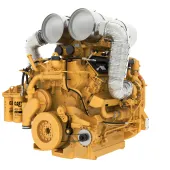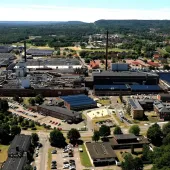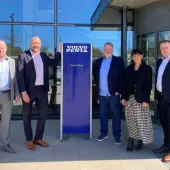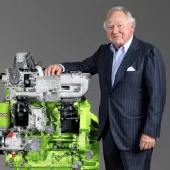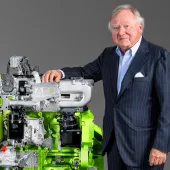How Stricter Emission Controls Will Affect The Quarry Industry

First published in the November 2016 issue of Quarry Management as Digging Deep to Go Green
Stricter emission controls – Stage V and Euro 6 diesel engine regulations – will affect the quarry industry, but exactly what will this mean? Kirstie Henry from AdBlue storage specialists Kingspan Environmental looks at the market and explains what is in store for the industry
The UK quarry industry is working under the guidelines set out by the European Commission to reduce emissions from diesel engines. Non-road and off-highway construction machinery is more commonly referred to as Non-Road Mobile Machinery or NRMM for short. When the new regulation came in this September what did it mean for operators of this type of equipment?
The first European exhaust emissions standard was introduced in 1970 for passenger motor vehicles. Since then updates to these regulations, known as Euro 1 through to Euro 6, have been introduced, with the latter making it a mandatory requirement for all diesel driven engines to reduce nitrogen dioxide (NOx) emissions by 67%.
NRMM, as used in the quarry industry, come under the European Commission legislation and are identified as any mobile machines, transportable equipment or vehicles that are not intended for carrying passengers or goods on the road. It includes, therefore, excavators, wheel loaders, dozers and dumptrucks, as well as smaller items and hand tools at the lower end.
Engines installed in NRMM under the Euro 6 classifications are further categorized according to the power rating of the engine, with these categories given limits for specified gaseous output. More commonly known as the engine’s Stage rating, the UK is currently working to the Stage IV classification, with the next big milestone being Stage V emission standards, scheduled to be implemented between 2019 and 2021. This will further align European non-road emission standards, including types previously exempted, and some of these will affect the quarry industry. This will include introducing stringent emissions standards for compression ignition (CI) engines and a change in the Particulate Number (PN) for engines between 56kW and 560kW, which were previously exempt.
The Emission of Gaseous and Particulate Pollutants Regulations 1999 is the UK legislation that governs emissions produced by NRMM, and sets the emission standards for carbon monoxide, hydrocarbons, and oxides of nitrogen for all diesel engines. The amendment to the regulations broadens that scope to include small spark ignition (SI) engines as well as engines over 560kW, which were previously exempt.
The popular emission-reducing technology used by OEMs on new equipment and machinery is selective catalytic reduction (SCR). The SCR process involves spraying a fine mist of a urea and water-based fluid called AdBlue into the catalytic convertor of the engine’s exhaust system, which in turn reduces the nitrogen oxide (NOx) emissions.
For operators running older, non-compliant equipment, compliancy may be achieved in a number of ways. The expensive option would be to replace all non-compliant equipment with new machinery that does comply and is fitted with SCR technology, using AdBlue. This will not be practical in the majority of cases and other options are therefore available.
Retrofitting a diesel particulate filter (DPF), effectively a ‘soot trap’, is one of the most common fixes, as is retrofitting a catalytic convertor to the exhaust system, mitigating particulate emissions; however, engine compartment space and cost may be limiting factors.
Lastly, retrofitting SCRF technology, a combination of SCR and DPF in one single system is another option, and an approach that is increasingly being used in the truck market.
The use of SCR technology and AdBlue with SCR and DPF are the most efficient countermeasures, and research shows that more than a 70% reduction in NOx can be achieved. With an increased requirement for quarry plant and machinery to use AdBlue, storing the liquid in a safe and secure manner is a high priority.
With an increased requirement to have stored AdBlue on construction, quarrying and mining sites, therein lies the critical challenge for quality storage techniques. The non-road and off-highway market is currently being supplied with ‘packaged products’, with AdBlue delivered in 10-litre cans or small drums. Companies such as Kingspan Titan are now providing the market with an entire range of bulk storage options through their BlueMaster range. Operators running large SCR fleets are able to store and dispense AdBlue safely on site, maintaining purity, complying with international regulations and ensuring the AdBlue remains pure for its lifetime in the tank. The Kingspan Titan BlueTruckMaster mini bulk storage unit also offers a portable AdBlue storage solution for when multiple machines need refuelling on remote projects in inaccessible locations, and where larger storage tanks cannot be sited.
‘The seriousness of this legislation is seen in the strict conditions now applied to OEMs when supplying new equipment,’ said Kirstie Henry. ‘In the UK there is a maximum £5,000 fine if an OEM supplies a new machine fitted with an engine that has not been type approved by the appropriate approval authority, which in the UK is the VCA (Vehicle Certification Agency). Breaking the regulations is an offence under the Consumer Protection Act 1987, meaning OEMs could face custodial sentences in addition to being fined, plus forced to recall and replace products.’
The machines used in the quarry sector, along with similar machines currently in use within the construction plant and machinery and allied sectors, still have some way to go to be fully compliant with emission standards, but for more information about the AdBlue solutions available visit: www.kingspantitan.com
• Subscribe to Quarry Management, the monthly journal for the mineral products industry, to read articles before they appear on Agg-Net.com



